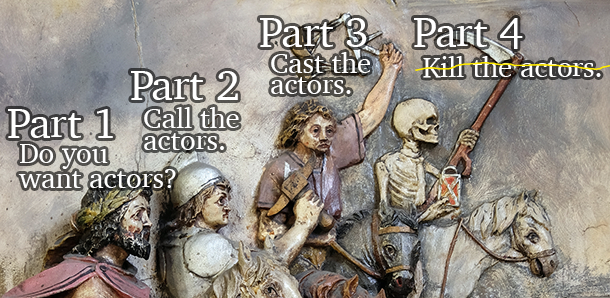
In the first three parts of this series, I covered:
Part 1 – Should you put voice acting into your game?
What level of quality do you need to achieve in the voice acting?
What are the pros/cons of commissioning versus using a casting call?
How much should you expect to pay?
How do you estimate the cost and time of adding voice acting for your game? (I included a “fill in the blanks” spreadsheet tool for your use.)
Part 2 – How to get actors to audition for your game by announcing a casting call?
What preparation is needed before your announcement?
What content should be written to describe your game and the parts in it? (I provided a template document for your use.)
What should a casting call announcement include?
Do you want to accept auditions through email or your Discord server?
How many auditions do you really want?
Where do you post your casting call?
Part 3 – How to coordinate auditions and make a good casting decision?
Mistakes to avoid – changing part descriptions, closing auditions early, giving extra information to some people.
What to do when you aren’t getting enough auditions?
How to judge audio quality of auditions?
How to judge the acting ability of auditions?
In this final part, I’ll describe what you need to do after the auditions are concluded.
The Day After Auditions Close
In Part 1, I bragged about how every actor who had gone through my casting call for The Godkiller - Chapter 1 had sent me their recordings within ten days of being cast. This great outcome with 40 actors was largely due to good luck. The entire group of actors happened to be consistently professional.
But the non-luck reason for fast, reliable delivery from the actors is pace-setting.
Some productions will wait a week after auditions close to announce casting decisions. This is understandable if you want to conduct extra auditions (callbacks) with people on your short list. But ideally, announce casting decisions the next day.
This is what the typical day after auditions close looks like for me.
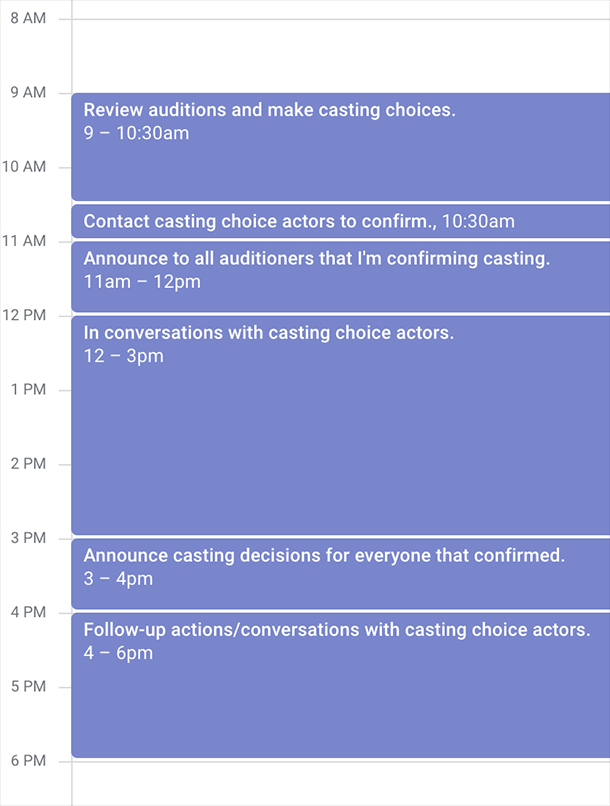
You’ll notice that the whole day is devoted to the aftermath of auditions. The Day After is definitely a flurry of communication. Then over the next week or so, there will be follow-up actions with cast actors that taper off.
In the morning, I give my full attention to listening to audition recordings to make a casting decision (covered in Part 3).
Then I fire off DMs or emails to all of my casting choices to confirm they will do it. For this, I use a little boilerplate customized to each recipient. Here’s an actual Discord DM I sent to Martin Beadle, who was cast for the part of God in my game.

Note the middle paragraph. This is where I remind the actor of the already-described terms for the part. I do this to avoid misunderstandings or attempts by the actor to negotiate beyond earlier terms set.
If I contact for confirmation the day after auditions close, actors almost always confirm within a few hours, and it’s rare that they take longer than 24 hours.
After I’ve sent DMs/emails to all casting choices, I don’t immediately announce casting decisions. It’s possible that some of these castings will fall through. (That’s why I’m confirming.) But I do let all auditioners know that I’ve made these contacts. Here’s a real post.
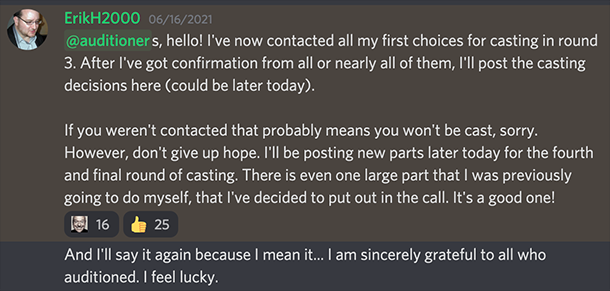
Why not just wait to post until all my casting choices are confirmed?
There’s a bunch of auditioners still wondering if they got a part – most of them will be not be cast. The kindest thing is to promptly let them know they were unsuccessful. Also, if there’s anyone who has a negative reaction to not being cast, I kind of want them to peel off early so that the community energy stays lovely. Finally, this extra message helps set a faster pace. It communicates that I am actively working on the project and trying to move things along to completion.
Throughout this article, I’ll be advocating many things that move the process along faster. You have more attention, context, and energy from the actors if you move quick. On the other hand, if you drag out the casting decision for a week, actors will mentally drift away from your project and take longer to perform all the little tasks leading up to delivery of their speech recordings for your game. It’s good for everyone involved to keep a fast pace.
In the afternoon, I usually have all casting choices confirmed as actors reply back to me. But sometimes there are one or two I’m still waiting on. I prefer to post casting decisions at that point and just note any straggler as “to be confirmed” without specifying the not-yet-confirmed actor’s name.
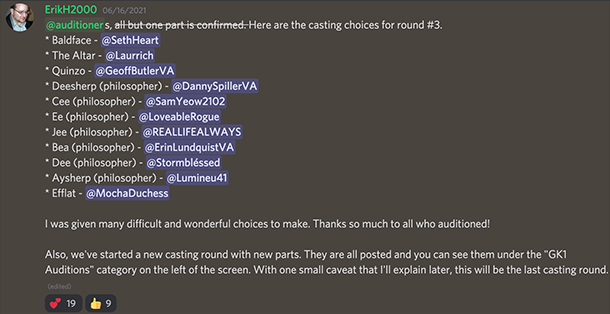
Then for the rest of the day, there’s a bunch of follow-up actions and communications with the actors. I’ll go into the follow-up actions below, but it’s stuff like having actors sign release agreements and paying them.
And then there is a terrifyingly transparent thing that I’m proposing you do…
Describe How You Made Your Casting Decisions
While it’s fresh in your mind, say how you made your decisions. And give that information to all auditioners. Writing this casting recap is optional. But I’ve heard such positive feedback from actors on the recaps I’ve written. I really think you should do it.
Here is one I wrote for a casting round of The Godkiller - Chapter 1.
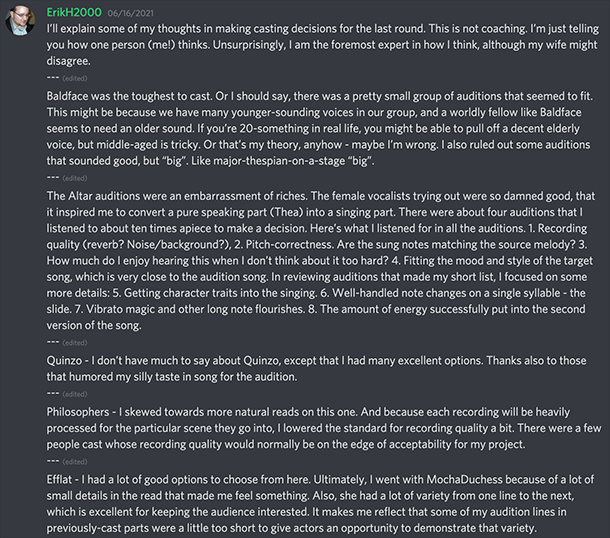
The actors are pretending to be some silly character in your game. And after doing this free work, most of them will still not get a part. If you’ve handled this as a public audition, the actors will have shared their personal abilities and flaws with their peers. Step into the light with the actors and share some portion of their vulnerability. Give them insight into how you, a potential client, think.
At the mid-tier level, (discussed in Part 1) many of the au



































